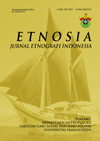Abstract
This article intends to discuss the phenomenon of cultural disruptions due to globalization and the industrial revolution 4.0 which have paradoxical consequences for empirical life and in the academic world, especially in the field of anthropology. This study uses a library method with interpretive analysis techniques. The results concluded that globalization and the industrial revolution 4.0 had fundamentally changed the order of the people's cultural values. This is a challenge for anthropology to reflect on epistemology and axiology as a logical consequence of changes in the ontology. In the context of Indonesia, the presence of anthropology is expected to be able to explore the plurality of national culture that can be narrated on the academic stage. At the same time, it can be also a productive cultural capital to overcome the challenges of diversity, becoming a driver of change, and strengthening national identity.References
Abdullah, Irwan. (1995). “Privatisasi Agama: Globalisasi atau Melemahnya Referensi Budaya Lokal?” Makalah Disampaikan dalam Seminar Sehari tentang Kharisma Warisan Budaya Islam di Indonesia “Islam dan Kebudayaan Jawa: Akulturasi, Perubahan dan Perkembangan”. Balai Kajian Jarahnitra dan Depdikbud Daerah Istimewa Yogyakarta.
_____________,. (2006b). “Dari Bounded System ke Boundaries Society: Krisis Metode Antropologi dalam Memahami Masyarakat Masa Kini”. Antropologi Indonesia, Vol. 30, No. 2, 2006.
_____________., (2006c). Konstruksi dan Reproduksi Kebudayaan. Yogyakarta: Pustaka Pelajar.
Anderson, B. (1999). Komunitas Imajiner: Renungan Tentang Asal-usul dan Penyebaran Nasionalisme. Terjemahan: Omi Intan Naomi. Yogyakarta: Pustaka Pelajar dan INSIST Press.
Appadurai, A. (1990). “Disjuncture and Difference in the Global Cultural Economy” in Mike Featherstone (Eds.). Global Cultural: Nationalism, Globalization, and Modernity. London: Sage Publications.
Ayatroehaedi. (1986). Kepribadian Budaya Bangsa (Local genius). Jakarta: Pustaka Jaya
Barker, C. (2005). Culture Studies Teori dan Praktik. Yogyakarta: Bentang Pustaka.
Barnard, A, (2000). History and Theory in Anthropology. Cambridge University Press
Bellah, R.N. (1985). Tokugawa Religion: The Cultur Root of Modern Japan. New York: The Free Press.
Depari, E., Mac’Andreus, C. (1998). Peranan Komunikasi Massa Dalam Pembangunan. Yogyakarta: Gadjah Mada University Press.
Eriksen, T.H.. (1993). Etnicity and Nationalisme: Antropological Perspectives. London and Boulder, Colorado: Pluto Press.
____________, (2015). Small Places, Large Issues An Introduction to Social and Cultural Anthropology, Fourth Edition. London : Pluto Press.
Freidman, T.L. (2002). Lexus dan Pohon Zaitun. Bandung: Penerbit ITB.
Fukuyama, F. (1999). The Great Disruption: Human Nature and the Reconstruction of Social Order. London: Profiles Book.
Giddens, A. (2000). Runaway World: How Globalization Reshaping Our Lives. London: Profile Books Ltd.
Hannerz, U. (1990). “Cosmopolitans and Local in World Culture”, in Mike Featherstone (Eds.). Global Cultural: Nationalism, Globalization, and Modernity. London: Sage Publications.
Hastrup, K, (1995). A Passage to Anthropology between experience and theory. London and New York: Routledge.
Huntington, S.P. (1996). The Clash of Civilization and The Remarking of World Other. New York: Simon & Schuster.
Kellner, D. (2002). “Theorizing Globalization”, Sociologi Theory 20. pp. 285—305.
Kumbara, A.A. N. Anom, Suka, G. (Ed), (2017). Wacana Antropologi Membaca Ulang Teks Kebudayaan Menuju Transformasi Diri dalam Multikulturalisme. Prodi. Antropologi Fakultas Ilmu Budaya, Universitas Udayana.
Lewellen, C.T. (2002). The Anthropology of Globalization, Cultural Anthropology Enters the 21st Century. USA: Bergin & Garvey.
Lull, J. (1998). Media, Communication, Culture: A Global Approach. Cambridge: Polity Press.
McLuhan, M. (1994). Understanding Media: The Extension of Man. London: The MIT Press.
McPhail, T.L. (2014). Global Communication: Theories, Stakeholders and Trends. West Sussex: Wiley Blackwell Ltd.
Naisbitt, J. (1988). Megatrends: Global Paradox. New York: William Morrow and Company, Ltd.
Ochame, K. (1999). The Borderless World. Power and Strategy in the Interlinked Economy. Revision Edition. London: Profile Bussines.
Parekh, B. (2007). Rethinking Multikulturalism: Keberagaman Budaya dan Teori Politik. Yogyakarta: Kanisius.
Pilliang, Y.A. (1998). Dunia Yang Dilipat: Tamasya Melampaui Batas-batas Kebudayaan. Bandung: Pustaka Matahari.
Putnam, H. (1981). Reason, Truth and History. Cambridge: Cambridge University Press.
Robertson, R. (1992). Globalization: Social Theory and Global Culture. London, California, New Delhi: Sage Publications.
____________. (1995). “Glocalization: Time-Space and Homogeneity-Heterogeneity”. In M. Featherstone, S. Lash, S. and Robertson, R., (Eds.). Global Modernities. London. Sage Publications.
Ritzen, J.W.E, Woolcock, M. (2000). “Good Politicians” and “Bad Policies”: Social Cohesion, Institutions and Growth”, in Policy Research Working Paper, Setember, 2448. Switzerland: World Bank.
Ritzer, G., Douglas J.G. (2005). Teori Sosiologi Modern. Jakarta: Prenada Media.
Sahlins, M. (1994). “Goodbye to Tristes Tropique: Ethnography in the Context of Modern World History', in R. Borofsky, (Eds.) Assessing Cultural Anthropology. New York: McGraw-Hill, Inc, Pp. 377-395.
Said, E. (2001). Orientalisme. Bandung: Penerbit Pustaka.
Storey, J. (2007). Culture Studies dan Kajian Budaya Pop. Yogyakarta: Jalasutra.
Suaedy, A. (2007). Politisasi Agama dan Konflik Komunal Beberapa Isu Penting di Indonesia. Jakarta: The Wahid Institute.
Sutrisno, M. (2008). Refilosofi Kebudayaan. Yogyakarta: Kanisius.
Tilaar, H.A.R. (2004). Multikulturalisme Tantangan-tantangan Global Masa Depan dalam Transformasi Pendidikan Nasional. Jakarta: Grasindo.
Weber, Max. (1958). The Protestant Ethic and the Spirit of Capitalism. New York: Charles Scribner’s Sons.





